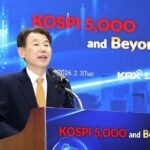Coupang Inc., South Korea’s largest e-commerce platform, was fined 140 billion won ($102 million) on Thursday for allegedly manipulating search algorithms to place private labels and products it directly sold at the top of search rankings, the country’s anti-trust body said.
The Korea Fair Trade Commission (KFTC) also issued corrective orders in relation to the allegation. It will report the online retailer and its affiliate CPLB in charge of private label management to prosecutors for investigations.
In an immediate response, Coupang filed an injunction against the decision, which it said ran counter to the digitalization trends and innovation.
The company argued that it is unprecedent in the world to raise issues with product displays and slap a fine that is more than half the combined penalty imposed on the country’s 500 leading companies in 2023.
The KFTC alleged that on Coupang’s platform, at least 64,250 private labels and products it directly sold had continuously appeared at the top of search results between February 2019 and July 2023 due to its search algorithm manipulation and search ranking adjustment.
Considering the significant impact of search rankings on consumers’ purchasing decisions, the alleged activities hindered competition and consumers’ rational choices, while distorting the distribution of resources, it added.
“Coupang has a dual status as a sales platform and a seller of its own products,” the KFTC said in a statement. “Due to its dual status, a conflict of interest may arise in selling its own products and selling vendors’ products.”
Private labels and the products directly sold by Coupang make up about 70% of sales at Coupang as of the end of 2022, up from some 60% at the end of 2019.
Some 210,000 vendors posted branded goods on Coupang’s platform.
Coupang, listed on the New York Stock Exchange, controls about one third of the domestic e-commerce market with 31.11 million monthly active users as of May this year.
Cho Hong-sun, vice chairman of Korea Fair Trade Commission, gives a news briefing about Coupang
PRODUCT REVIEWS BY EMPLOYEES
Coupang’s employees were found to have written positive reviews on private labels and the goods it directly sourced from manufacturers between February 2019 and July 2023, according to the government agency. They were also alleged to have assigned high rating scores on them.
The KFTC said that 2,297 executives and employees of Coupang had posted 72,614 reviews on at least 7,342 products on the platform.
Sales in the products with positive feedback and high rating scores given by Coupang employees had climbed, whereas other products suffered a decrease in sales.
Following the anti-trust decision, Coupang cancelled a ground-breaking ceremony scheduled for June 20 to build a new fulfillment center in Busan, South Korea’s second-largest city.
The construction is part of its 3 trillion-won logistics investment plan announced in March this year to expand its Rocket Delivery service across the country.
The online mall operator said that it will put its facility investment plan back to square one, which may include ceasing the Rocket Delivery, or the next-day delivery service.
“It would be difficult to continue to provide Rocket Delivery services if we cannot freely recommend and sell private label products and those we directly purchase, considering their high inventory levels,” it said in a statement.
Some industry observers view Coupang’s strong protest against the KFTC’s decision as aimed at gaining the upper hand in legal disputes with the commission.
By Yeong-Hyo Jeong and Jae-Kwang Ahn
hugh@hankyung.com
Yeonhee Kim edited this article















